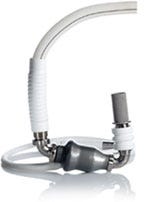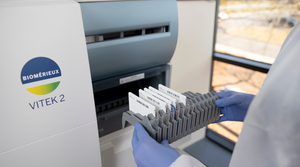St. Jude Medical to Pay $3.4 Billion for Thoratec
July 22, 2015
The deal helps round out St. Jude's menu of heart failure devices and services.
|
HeartMate II, as shown on Thoratec's website |
Chris Newmarker
St. Jude Medical will spend $3.4 billion to acquire Thoratec, a major LVAS player on the U.S. market.
The deal, which St. Jude and Thoratec announced on Wednesday, is expected to close near the end of the year. Under the agreement, Thoratec's executives get until August 20 to shop around for a better deal.
The merger presents a further boost to St. Jude Medical's "innovation-based growth strategy" to expand and enhance its established presence in heart failure therapies, St. Jude CEO Daniel J. Starks said in a news release.
The company already has its quadripolar cardiac resynchronization therapy and remote monitoring capabilities. The CardioMEMS device, which St. Jude spent $375 million to acquire amid its FDA approval last year, is about the size of a paper clip and uses MEMS technology originally designed to monitor jet engines to remotely monitor a heart failure patient's pulmonary artery pressure.
Thoratec's HeartMate II is touted as the most widely used and extensively studied left ventricular assist device. Earlier this year, the Pleasanton, CA-based company company received FDA approval to enlarge its pivotal trial for its much-anticipated, next-generation HeartMate III.
Also on Wednesday, St. Jude announced it earned $290 million off $1.41 billion in sales for the quarter ended July 4, versus profits of $270 million off $1.45 billion in sales for the same period a year before. Take out the effects of currency fluctuations, and St. Jude's sales would have been up 6%. On the same day, Thoratec announced preliminary unaudited revenue around $128 million to $129 million for the second quarter.
The deal will allow St. Jude to enter new markets worth more than $1 billion, and expected to grow 10% a year, according to the companies. Both companies say they have strong relationships with heart failure physicians and cardiac surgeons, relationships they should be able to leverage for each other's products.
Not everything has been rosy for Thoratec, however. The company had one of the scariest recalls of 2014 when it came to the HeartMate II. The issue actually has nothing to do with the LVAD itself, but rather is related to patients and caregivers who were unable to understand instructions and lacked the training needed to hook up a back-up system controller in cases of device alarm or malfunction. Besides resulting in four deaths, such difficulties also caused lost consciousness or reduced blood flow for five other patients.
There have also been questions about whether Thoratec can hold onto market share.
Refresh your medical device industry knowledge at MEDevice San Diego, September 1-2, 2015. |
Chris Newmarker is senior editor of Qmed and MPMN. Follow him on Twitter at @newmarker.
Like what you're reading? Subscribe to our daily e-newsletter.
About the Author(s)
You May Also Like


